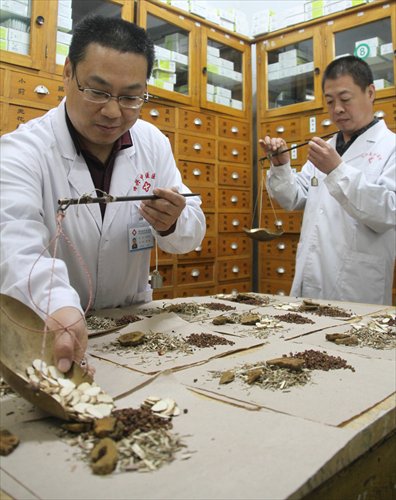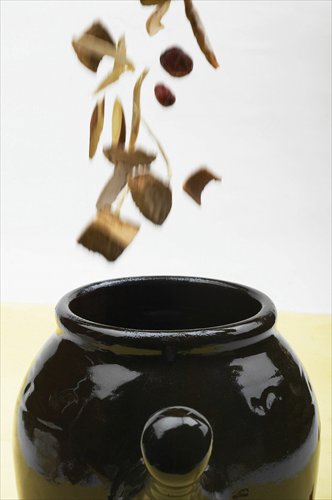HOME >> CHINA
Toxic drugs
By Zhang Yiwei Source:Global Times Published: 2014-1-16 20:23:01

A TCM doctor competes at a TCM prescription competition on October 22, 2013 in Binzhou, Shandong Province. The competition judged participants on their speed as well as the accuracy with which they formulated and provided prescriptions. Photo: IC

Photo: IC
Critics of traditional Chinese medicine (TCM) are pouncing on the damning findings of a medical report published in PLOS ONE - an open access, peer reviewed scientific journal from the non-profit organization, the Public Library of Science - which indicated that TCM is a major cause of acute liver failure in China.
The article said that of the 177 patients included in the study, 17 percent of the patients who developed acute liver failure had received herbal remedies, and it was believed to be a more frequent cause than any other factor.
Published on November 22, 2013, the article has stirred a fierce debate within China. Critics cite instances of harmful side effects, while backers say that TCM remains a legacy of Chinese history, and has had beneficial outcomes.
Despite the fact that links between the potential toxicity of TCM on liver and kidney functions have been outlined in previous reports, acknowledgment of the risks remains rare, even within the Chinese medical community, and research is still lacking.
Liver failures
The article said that of all the patients diagnosed with acute liver failure after January 2007 in the study, 77 (43.5 percent) developed the condition due to drug toxicity, 52 (29.38 percent) due to indeterminate causes, 20 (11.3 percent) had acute viral hepatitis and 28 (15.82 percent) due to other causes.
Of the patients with acute liver failure induced by drugs, 30 had received herbal remedies, occupying 16.95 percent of all the patients. This represented the highest percentage of instances of liver failure caused by drugs, including acetaminophen, which takes up roughly 12 percent and is one of the main causes of acute liver failure in Western countries. The study aimed to investigate the causes and outcomes of acute liver failure in China to better plan medical treatments in future, since no extensive investigation has been performed regarding the disease, said the article. The findings on TCM take up a small portion of the article and do not touch upon its toxicity.
Even though the article is the first to provide data regarding TCM's function specifically in relation to acute liver failure, there have been many findings on how TCM can cause other diseases.
Liver damage caused by TCM took up 4.8 percent to 32.6 percent of all drug-induced liver damage, according to a result released by a national liver disease academic conference in 2005, while Practical Preventive Medicine published an article in September 2013, pointing out that among the 12,527 drug-induced liver damage cases mentioned in more than 200 academic articles published from 2003 to 2007, 2,026 were caused by TCM, taking up 16.17 percent, just to name a few academic findings.
Occasionally, a specific TCM drug will gain public attention for all the wrong reasons. In July 2013, heshouwu, (polygonum multiflorum), a drug used to treat baldness, was revealed by a research paper to be a potential cause of liver damage.
Reports surfaced of people's baldness getting worse, and even being killed by taking the drug.
Zhao Pan, from Therapy and Research Center under the, 302 Military Hospital of China, one of the authors of the article published on PLOS ONE, told the Beijing-based Life Times that the quantity of TCM dosages should be delicately controlled so that the harmful effects can be reduced as much as possible, and patients should not fall for folk prescriptions, and instead should only visit qualified doctors and hospitals.
Research lacking
"TCM does have toxic side effects on the liver and kidneys. Liver damage induced by TCM is generally due to the lack of acknowledgement of the drug's toxicity," Luo Daluo, a Beijing-based TCM doctor told the Global Times, noting that the safety of TCM is closely related to the dosages taken. He said another cause is that patients take the drug over a long period, such as a year or more, which is too long and does not accord with TCM theory.
An article published in Practical Preventive Medicine, pointed out that limited knowledge of TCM and its toxicity is an important factor that causes TCM-induced liver damage, and found that the drugs used for preventative health care were the most common cause of the condition. It also said that most patients have relatively long treatment process when it comes to TCM, with more than 43 out of 157 patients taking TCM for more than two months.
In 2011 TCM fever reached a peak, when a TCM diet therapist caught public attention by claiming that a diet of mung beans and eggplants could cure almost all diseases.
Luo noted that even though individual drugs can have a certain level of toxicity, the compatibility of medicines in each prescription can reduce this toxicity, and the doctors' job is to find a balance to make the prescription more effective. "But that's still a difficult job," Luo said. "We need to deepen research into it."
Zhou Sufang, a doctor with the Guizhou Province Hospital of Traditional Chinese Medicine said in a research paper in 2010 that even though research into TCM's toxicity on the liver has been strengthened, the toxicity level of over 90 percent of TCM remains unknown and requires systematic research.
Reports have detailed the lack of knowledge regarding how the elements of TCM actually work, and its potential toxicity combined with the lack of knowledge has been a massive barrier to its sale on the international market. But TCM backers have received some good news in recent times, after a research report on the safety of TCM won first prize in the State Council's National Prize for Progress in Science and Technology on January 10.
The research project, which took place over 10 years, explained how herbal ingredients work and analyzed the classic theory of TCM through modern biological mechanisms, which may pave the way for TCM to be more comprehensively understood.
Posted in: Society